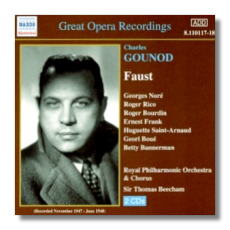
The Internet's Premier Classical Music Source
Related Links
- Gounod Reviews
- Latest Reviews
- More Reviews
-
By Composer
-
Collections
DVD & Blu-ray
Books
Concert Reviews
Articles/Interviews
Software
Audio
Search Amazon
Recommended Links
Site News
 CD Review
CD Review
Charles Gounod

Faust
- Georges Noré (Faust)
- Geori Boué (Marguerite)
- Roger Rico (Méphistophélès)
- Roger Bourdin (Valentin)
- Huguette Saint-Arnaud (Siebel)
- Betty Bannerman (Martha)
- Ernest Frank (Wagner)
- Hubert Dawkes and Herbert Dawson, organ
Royal Philharmonic Orchestra & Chorus/Thomas Beecham
Naxos 8.110117-18 ADD monaural 2CDs: 68:26, 68:14
Until recently, I had the greatest contempt for Gounod's Faust, not because it is untrue to Goethe's play (I couldn't care less, really), but because I found it musically trivial. I don't know what changed my mind, but I do know that my old attitude was formed, at least in part, by uncomprehending recordings such as the one by Sutherland and Corelli, which treat the score with Wagnerian pretentiousness and barnacle it over with tradition.
My opinion began to change a few years back when I heard Beecham's English-language version with Heddle Nash in the title role. (This 1929-30 recording can be purchased very inexpensively, albeit without the Walpurgisnächt Scene, on Opera d'Oro OPD-9010). Here, Beecham treats the music lightly and with charm, and his singers have plenty of character. The sound is hardly modern, but Faust seldom has been so entertaining.
It is important to remember that Faust is a lyric French opera first, and only second a tragedy based on Goethe. Beecham, ever mindful of the proper spirit of things, got the order right the first time, and he got it right again in the 1947-48 remake reviewed here. This time, Beecham brought French soloists in to London's Abbey Road studios to record Gounod's most famous opera in its proper language. Again, the result is a Faust so graceful and appealing that you can hear it twice in one day without getting indigestion.
The singing is wonderful too. Noré's voice is exciting, with a tight vibrato that enlivens Gounod's most traditional phrases, and his Faust is a believably romantic figure. I recently "discovered" Boué on an old French Decca recital LP. Her voice is a perfect match for Noré's; in fact, I wouldn't be surprised if their vibratos were exactly in synch. Boué's Marguerite is the real thing: an ingénue, not some old cow pretending to be sixteen again. Her high notes - tremulous with passion, not weakness - send shivers down my spine (the good ones) in the final trio. The downside is that the Siebel, Huguette Saint-Armand, has the same kind of voice, so I guess it is good that Beecham (like almost everyone else) cuts the scene at the start of Act Four where Siebel tries to console the bereft Marguerite. Beecham cuts Valentin's "Avant de quitter ce lieux," presumably because it was added by the composer when Faust was first performed in London and is not "authentic." As this is one of the opera's most famous arias, this takes authenticity too far, because Roger Bourdin should have done a fine job with it. Shorn of his big moment, he still makes a positive impression. Finally, praise also must be given to Roger Rico. Again, his is a gentlemanly Méphistophélès in the best French tradition. He is charming and sophisticatedly mocking, and much of the time you have to listen hard to see the horns on his head and the fork in his tail. (Compare and contrast with Boris Christoff, who is demonically intimidating from the get-go.) A fine moment in this recording comes near the very end: when Marguerite dies, Rico sings "Jugée!" (Judged!) as if he knew it all along, but the chorus immediately puts him down with an emphatically contradictory "Sauvée!" Take that, Prince of Darkness!
This recording originally was released on thirty-two 78-rpm sides. If it had been made just a few years later, it would have been released on LP. That probably explains why this recording is not known by more people; in 1953, André Cluytens recorded a Faust with Victoria de los Angeles, Nicolaï Gedda, and Boris Christoff. This would remain the definitive recording until the four of them did it again in stereo a few years later. Beecham got lost in the shuffle.
Ward Marston has done the transfers again, and the sound is excellent, although Rico's voice sometimes is harshly caught by the microphones. The booklet contains a plot synopsis and a brief note. I miss the usual comments by Marston about where the recordings come from, and what he had to do to get the best sound from them.
Lacking both Valentin's aria and the Walpurgisnacht scene, this is not the best way to introduce yourself to this opera. However, with Beecham's English-language recording, it is one of the best Faust perfromances on disc. I recommend it with enthusiasm to anyone who loves this opera.
Copyright © 2001, Raymond Tuttle




















